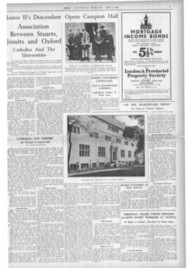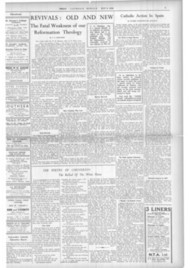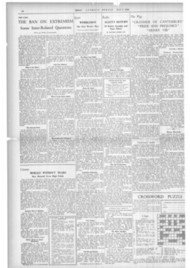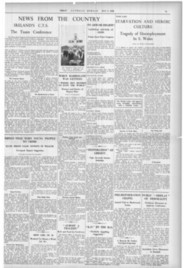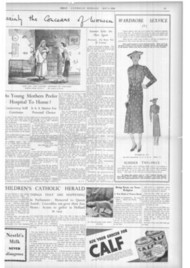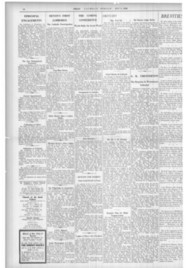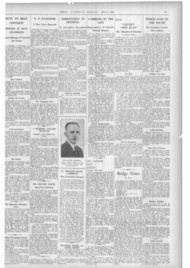Page 7, 3rd July 1936
Page 7

Report an error
Noticed an error on this page?If you've noticed an error in this article please click here to report it.
Tags
Share
Related articles
University Degrees
Cardinal Seredi At Oxford
To Be Or Not To Be The True Church
On The Other Side, The Statutes Of The University Of
Cardinal At Oxford
Catholics And The Universities
A few days after the official opening of the new buildings at Campion Hall and the granting of an honorary degree by Oxford University to Cardinal Seredi, the University of London in its centenary year has conferred the honorary degree of D.Litt. to the Archbishop of Westminster.
The connection between English universities and the Catholic Church in this country has been peculiarly happy during this century. Into Oxford with its Church of England tradition not only individual Catholics but also Catholic institutions for the education of religious have poured. Two are part and parcel of the University, others are indirectly closely connected, and though there are still some of the old school or from abroad who find it hard to understand the apparent engulfing of Catholics and Catholic houses by a sea of secular learning, few of those who have had personal experience of the experiment, at any rate in Oxford, find it to have been unsuccessful. In fact the sea seems to have receded leaving little islands standing out and growing ever bigger.
In London University the problem has been different and much simpler. Strangely enough—for in every other respect London is a great and ancient city—the University of London is only a hundred years old, having received its charter as an examining and degreegiving institution in 1836. Though one of its two earliest colleges, King's College, was a Church of England foundation, the University was designed as a home for freedom of thought. Both in respect of this its original purpose and of its much looser and freer discipline bearing less directly on its many students it has welcomed and been welcomed—as Mgr. Hinsley pointed out last Sunday—by Catholic students, whether studying for the priesthood or for a secular career. In the late seventies of the last century it was in close relation with Cardinal Manning's Catholic University College and in 1909 its Catholic Society was founded served by chaplains from Canon Driscoll to Dr. Mathew to-day.
Much the same has been the story of the connection between Catholics and provincial Universities.
It would indeed seem at first sight that the very secularism, comparative lack of tradition and the independence of students in the newer Universities, in these respects more akin to the continental Universities, enable Catholics to study in them with less danger of their Catholic outlook being affected. It may be that the protection afforded to Catholics at Oxford and indeed the great chance they now receive there of deepening their Catholic mind are the result of a series of lucky accidents as well as a signal tribute to the best in the English character as represented both in the University and in the Church in this country. Catholic houses there have received from Oxford both scholarship and kindness while no one can compute what they give in exchange and how much of what they give influences in a roundabout way individual Catholic students.
Still it is well to remember that University education for Catholics continues to raise, problems. The careful instructions from Rome when Catholics were for the first time encouraged to study at Oxford and Cambridge were far from being old-fashioned obscurantism.
In Cambridge, for example, a bigger University than Oxford, more secular and positive in its outlook and philosophy than its elder sister and less happily situated as regards the number of Catholic centres in it, the problems are, we are told, acute.
It stands to reason that every possible means must be taken to provide the Catholic boy or girl who comes straight from school into an atmosphere more or less impregnated with indifference and the self-sufficiency of wholly secular learning with every opportunity of balancing and steadying his mind through the publicly and privately given help of Catholic teachers and priests. Those who go straight into the world of business have much to face, but at least they are spared the lectures of the learned who find the Faith both antiquated and unnecessary.
In the long run, however, it remains true that practically every Catholic has to face a world in many ways alien to the world in which he has been brought up. If his character and grounding in the Catholic mind are sufficiently strong he will come through. It is after all in the home and the school that he ought to receive the training that will protect him, and critics of the present status of Catholics in the Universities may be met by the retort that the man is made or marred before the University stage.
There is truth in the claim, but not the whole truth, and those concerned will not rest until every possible safeguard and precaution have been taken.
blog comments powered by Disqus




